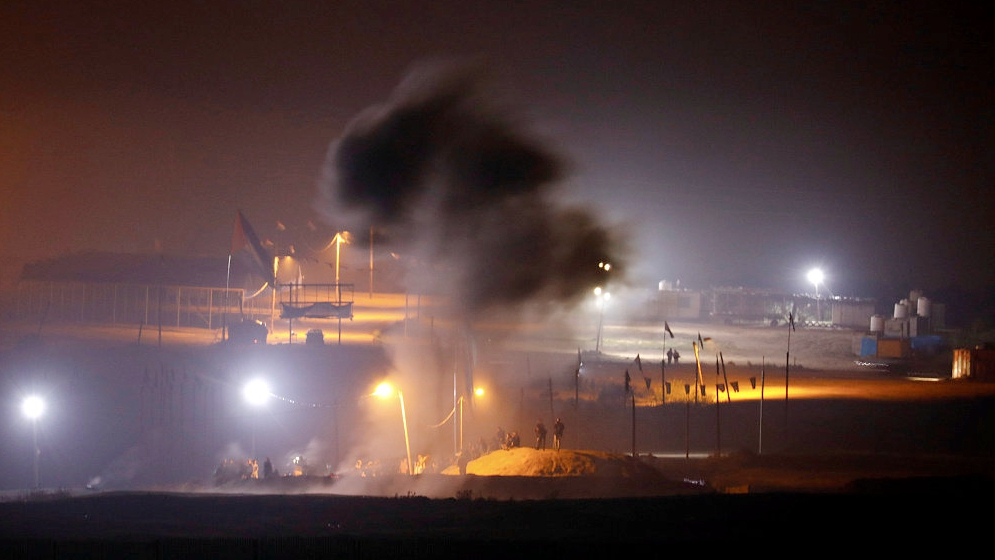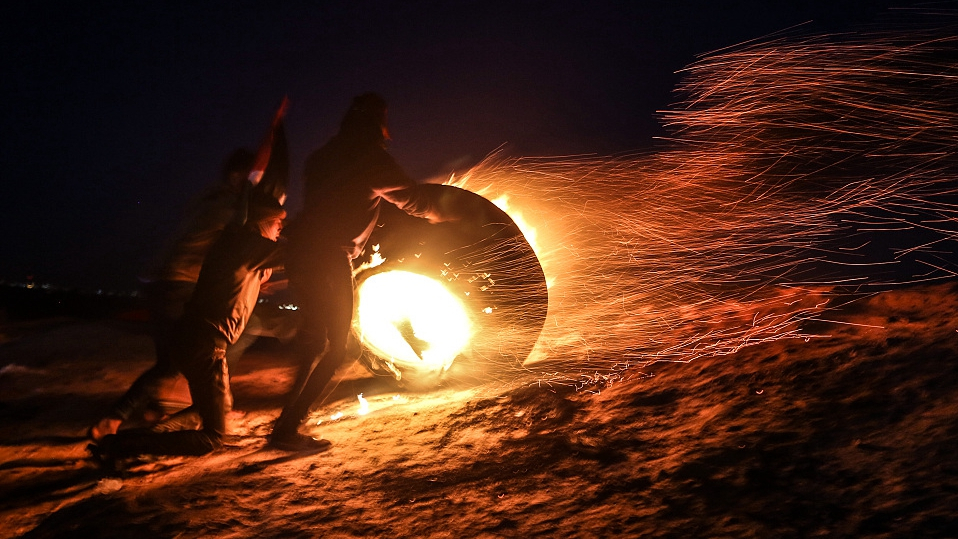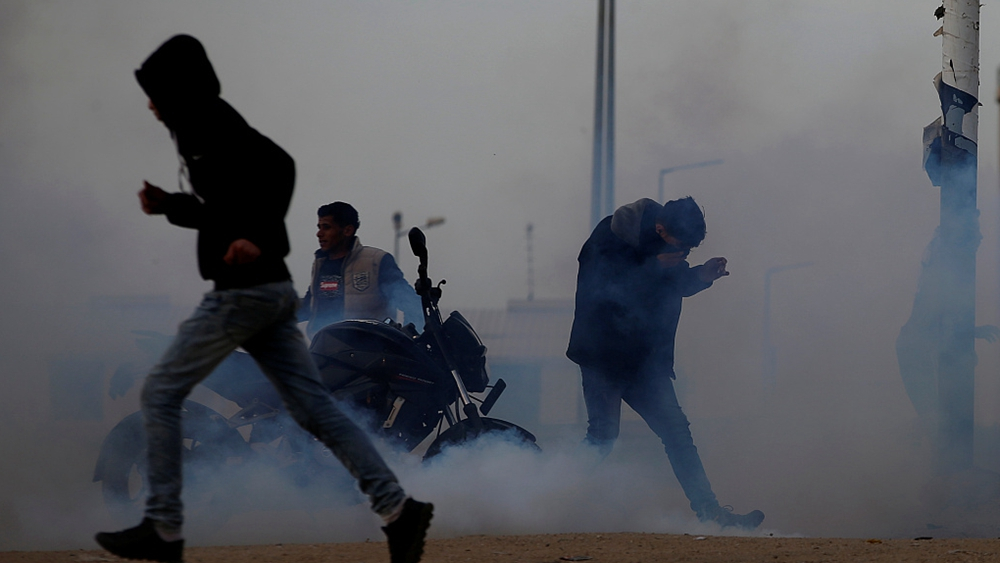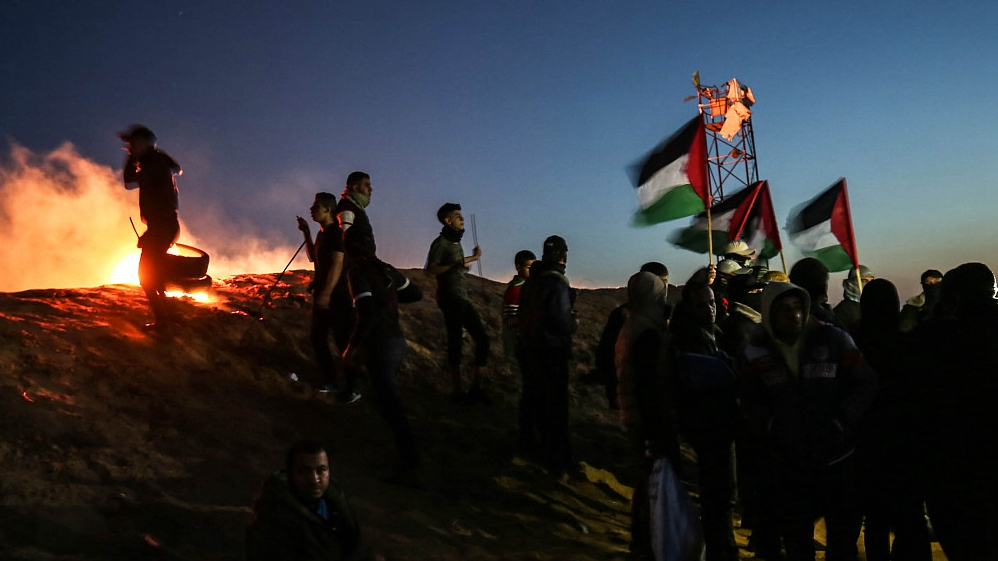
Middle East
15:41, 30-Mar-2019
Gaza's 'night disturbers' put Israeli border villagers on edge ahead of anniversary
CGTN

Hurling pipe bombs and setting off firecrackers, "Night Disturbance Units" have become a new phenomenon on the Gaza-Israel border in the run-up to the first anniversary of deadly border protests.
Organizers say the intention of the night-time events is to fray the nerves of Israeli military lookouts and to lower morale in Israeli villages along the 48-kilometer frontier.
With loudspeakers blaring patriotic music into the dark, the dusk-till-dawn demonstrations began small and escalated in recent days, ahead of a massive protest rally expected at sites along the frontier on Saturday.
"We come at night to prove to the occupation that we do not fear your weapons, they should fear us," said one 20-year-old Gazan undergraduate.

Palestinian protesters take part in a night demonstration near the fence along the border with Israel in Rafah in the southern Gaza Strip, March 19, 2019. /VCG Photo
Palestinian protesters take part in a night demonstration near the fence along the border with Israel in Rafah in the southern Gaza Strip, March 19, 2019. /VCG Photo
"We burn tires, hurl stones, make noises using firecrackers. Why should our people suffer alone, they should suffer too," added the protester, who declined to be named, fearing Israeli reprisals.
Although scores of Gazans attend, the night protests are not as big as in the daytime. In the dark, the demonstrators cannot see far as they face off against Israeli security forces firing tear gas, rubber bullets and live ammunition.
Last Sunday, a 24-year-old man died after being wounded by Israeli gunfire overnight, said Gaza health officials. The Israeli military said explosives had been hurled at the fence that night, and its forces "struck two Hamas posts in response."

Palestinians react to tear gas fired by Israeli troops during a protest at the Israeli-Gaza border fence, east of Gaza City, March 29, 2019. /VCG Photo
Palestinians react to tear gas fired by Israeli troops during a protest at the Israeli-Gaza border fence, east of Gaza City, March 29, 2019. /VCG Photo
Israeli troops have killed nearly 200 Palestinians at the weekly border protests, which began on March 30 last year, and have wounded thousands more.
Israel's lethal response has often been criticized for targeting protesters who pose little threat to heavily armed soldiers. UN investigators said last week that Israeli forces may be guilty of war crimes for using excessive force.
Israel rejects the criticism, saying its troops are defending the border against rioters, and it has no choice but to use lethal force where necessary. Israeli commanders say they are protecting the residents of nearby Israeli towns, who live in fear of Palestinian rockets and militant infiltrators.

Palestinian protesters take part in a night demonstration near the fence along the border with Israel in Rafah in the southern Gaza Strip, March 19, 2019. /VCG Photo
Palestinian protesters take part in a night demonstration near the fence along the border with Israel in Rafah in the southern Gaza Strip, March 19, 2019. /VCG Photo
"We hear the bombs they throw at our soldiers every night - hundreds of bombs, hundreds of explosions," said Yifat Ben-Shushan, a bleary-eyed mother of two from Nativ Haasara.
The Gaza protesters are calling for the lifting of a blockade imposed by Israel and Egypt, and for Palestinians to have the right to return to land from which their families fled or were forced to flee during Israel's founding in 1948.
Security in the south is expected to be an important issue in Israel's April 9 election, when right-wing Prime Minister Benjamin Netanyahu faces a strong electoral challenge after a decade in power.
Source(s): Reuters

SITEMAP
Copyright © 2018 CGTN. Beijing ICP prepared NO.16065310-3
Copyright © 2018 CGTN. Beijing ICP prepared NO.16065310-3